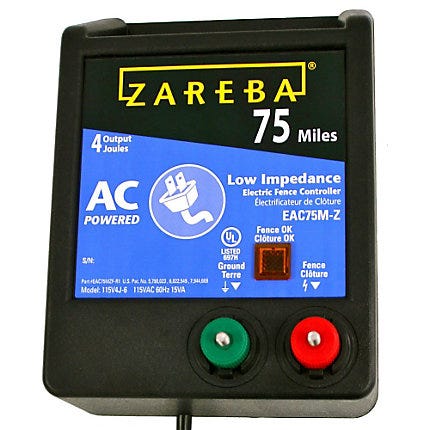
In general, the options for electric fence chargers come down to three choices – AC power, DC power or solar power. In most instances, AC power is the way to go if you can set up your fence in a way that gives you easy access to an electrical outlet.
What else makes an AC charger stand out among the other two options? Consider these points:
Reliability & Energy Output -- Courtesy of the Grid
Thanks to their connection to the electricity grid, AC chargers tend to be more reliable than other charger types – no matter what stresses the fence encounters, there’s still juice running through it. Likewise, the power going through the fence charger tends to be stronger, which allows an AC charger to support longer fences (or more lines). The power output of solar and DC chargers, while suitable for shorter fences, simply cannot match the strength of an AC charger.

Convenience
Not enough can be said about the simplicity and convenience of operating an electric fence with an AC energizer. Just plug the energizer in to send an instant flow of power through your fence. You’ll know that as long as your power is operating, then your fence is hot.
Further, a large AC charger can be used to power an entire grid of fences if need be – with that sort of set up, you only need to worry about maintaining and protecting one charger.
Low Impedance
Because AC fence chargers essentially have an unlimited supply of energy, they can operate with a heavier fence load – that is, they can power more “fence area.” The thing is, when weeds or other vegetation grow and touch the fence, they add to the load by spreading out the flow of electricity to more areas.
Low-impedance chargers recognize drains created by weeds and/or lengthy fence lines and make up for it by increasing electricity output. Both solar- and DC-powered fence chargers offer low impedance features, but AC chargers deliver energy over much longer distances.
Low Cost
Although AC chargers are plugged into an electrical outlet, don’t expect a massive bill from the power company. AC chargers are mostly passive devises that use only a trickle of energy each day. Most users will see an almost imperceptible change in their energy consumption, amounting to less than a dollar for an entire month.
If you want to try the calculation yourself, here’s the formula:
- (The charger’s watts per day x days used per month)/1,000 = Killowatt Hours Used per month
From there, you simply check to see how much your electric company charges you per kilowatt hour and multiply that number by the result above.
Here’s an example:
- The typical Zareba® fence charger uses about 33 watts per day. So, 33 watts multiplied by 31 days is 1,023. Divide that by 1,000 to get 1.023 kilowatt hours per month.
The U.S. average cost of a kilowatt hour is 12 cents. Next, multiply 1.023 by 12 cents (.12), and we find the cost of running that electric charger is 3 cents for the entire month.
Twelve cents? What a great deal!
 AC chargers are usually considered the best option for electric fencing since these energizers deliver such a consistent amount of power.
AC chargers are usually considered the best option for electric fencing since these energizers deliver such a consistent amount of power.A few reminders about AC Chargers
Once you commit to adding an AC electric charger to your fence system, you should take steps to protect the charger from being damaged.
- Storm Protection – Since your AC electric fence energizer is going to be connected to both the fence and your electrical system, it’s important to invest in lightning protection. These simple add-ons can protect your charger, depending on which “side” of the charger the lightning strike occurs. With a Zareba® Storm Guard, electrical storm hits on your fence can be absorbed before they reach your charger. The Storm Guard is included with all 100 mile and 200 mile charger purchases.
- Sheltering Your AC Charger – One important requirement for an AC charger is that it needs to be protected from the elements. Though weather resistant, these chargers are not weatherproof and need to be shielded from getting wet. With that in mind, an AC fence charger should be mounted inside a barn or other outbuilding. If that’s not possible, build a protective case that mounts on a fence post. This case should seal the energizer from the weather while still allowing connections to the fence and an outlet.
Is an AC Fence Charger Right for Your System?
Are you still not sure about purchasing an AC charger for your electric fence? Reach out to us when you visit Zareba® on Facebook, where you can join in the conversation with the entire community of farmers and ranchers who rely on Zareba® for eelectric fence supplies. Our Consumer Care Team is also available to help you make your decision – call them at 855-5-ZAREBA.
Finally, be sure to subscribe to the Zareba® E-Newsletter where you can learn more about fence chargers and fence supplies.



